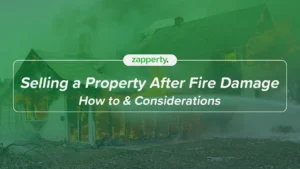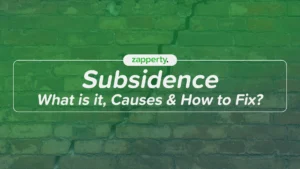Fire is any homeowner’s worst nightmare. Alongside the devastation of losing treasured possessions and the roof over your head, the financial impact can be huge. Even with insurance, you will have to find somewhere else to live in the short term, and the long-term value of the house could be significantly reduced.
Alongside potential structural and contamination issues, a house previously damaged by fire may also be less desirable to buyers, all of which can lead to stress for you.
After a fire at a house, you’ve generally got three options; sell as it is, restore it to sell or restore it to move back in. This guide will explore selling a property after fire damage, understanding the market and what this means for you.
Assessing a house damaged by fire
The first step after a fire at a house is to contact your insurance company to start the claims process. You’ll need to tell them the date of the fire as well as the room(s) affected and the extent of the damage. If possible, take plenty of photos and videos of the property to support your claim. You’ll also need to put together an inventory of damaged or lost items and their value.
However, do not enter any fire-damaged property unless told it’s safe by the emergency services.
A fire at a house can cause major structural issues as well as releasing potentially harmful substances and it’s the owner’s responsibility to make the property safe for the public.
This means completely securing the building by boarding up windows and doors and putting fencing around the perimeter. You might also have to install proper ventilation with HEPA filters to capture and remove fine particulates from the air and disperse lingering smoke particles.
Legal and insurance considerations
After this, your insurance company will send a loss adjuster or assessor to fully evaluate the extent of the damage. What you do next will completely depend on their assessment. It’s also important to contact your local council or planning authority to understand if you have any legal obligations that come with selling.
In simple terms, they’ll either decide if the property can be repaired and give you an idea of the expected costs to do so, or they’ll deem that it’s not cost-effective or safe to repair. In this case, it will need to be demolished.
If you decide to repair the home, you will still need to declare the previous fire damage to any buyer, mortgage lender or insurer when it comes to selling. Some buyers may find it more expensive to borrow or insure it and will pull out of the deal. That said, some owners also take the opportunity to add an extension or otherwise improve the new building to add value.
Regardless of which you choose, we’ll make a cash offer on any home within seven days, removing all the stress and hassle from the process.
Selling a Property After Fire Damage – Preparing the property
Preparing a fire-damaged property for sale will depend on who’s buying it. As we’ve discussed, you’ll need to make sure it doesn’t represent a hazard to the general public. However, anything more than that is your choice.
If you choose to completely rebuild the property, then you’ll need to employ builders, electricians, plumbers etc. to carry out the work. The new property will also need to pass a building inspection and be signed off before selling.
You might be surprised at how popular a fire-damaged property for sale can be. Tradespeople, property developers and those looking for cheap(er) projects are often on the hunt for suitable buildings and plots of land. Lots of owners sell at auction or contact developers directly, but you can also advertise it on various property listing sites.
A lot of developers and builders will also handle the cleanup and/or demolishing of the existing structure, but they’ll expect a reduction in the price to account for this. If you can do it yourself, you may be able to save some money.
If you’d rather sell as-is, then the process is fairly similar to a normal property sale. You’ll need to disclose all the relevant information and have all the usual documents to hand before going through the usual steps involving surveys and conveyancing.
Selling a property after fire damage can be the last step in moving on from a traumatic experience. However, it can also represent a new start. What’s more, it doesn’t have to be stressful.
After you’ve secured and made the property safe, you can weigh up your options to decide what’s best for you. You may choose to rebuild it and sell it as a brand-new home or simply sell it as-is. Either way, Zapperty can help you sell your property fast, without hassle or fuss. Contact us today to find out more.





